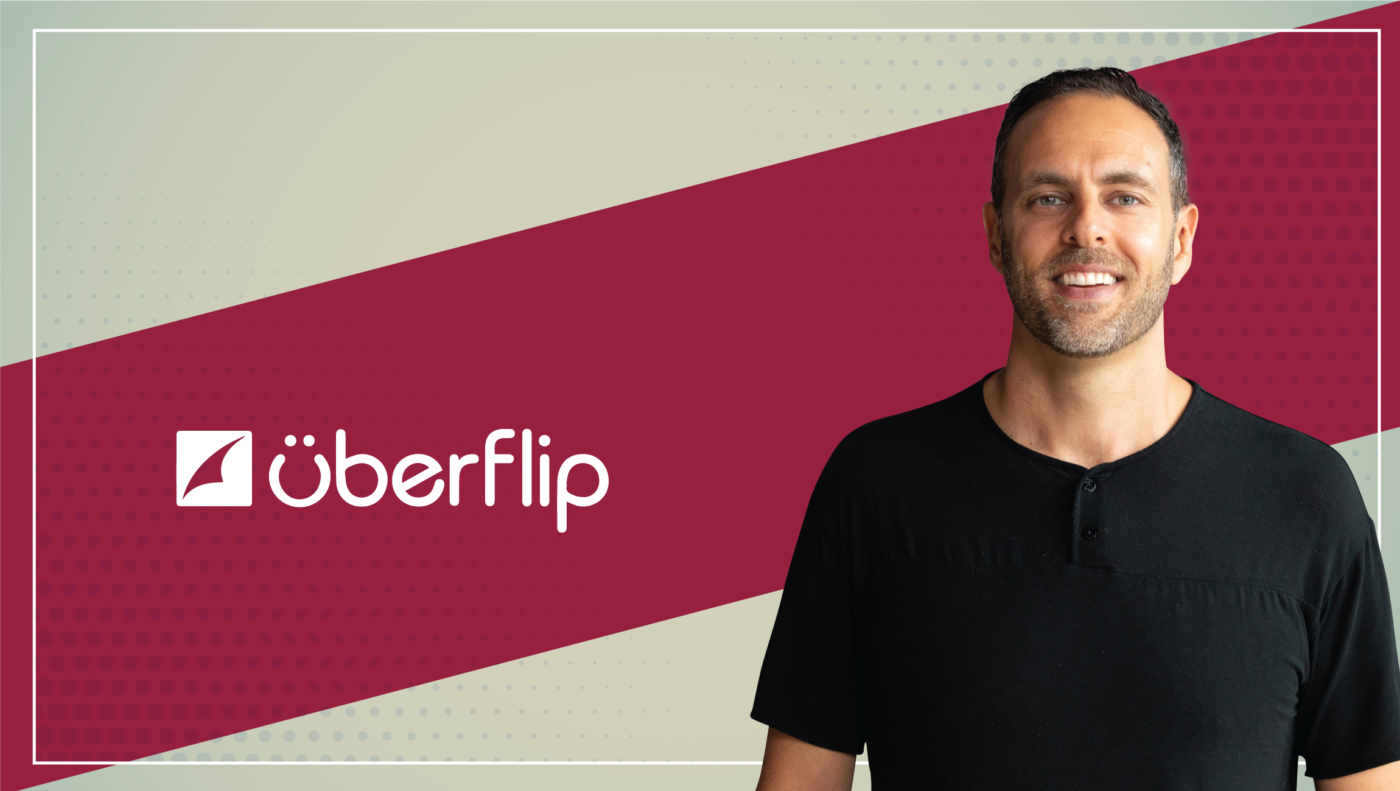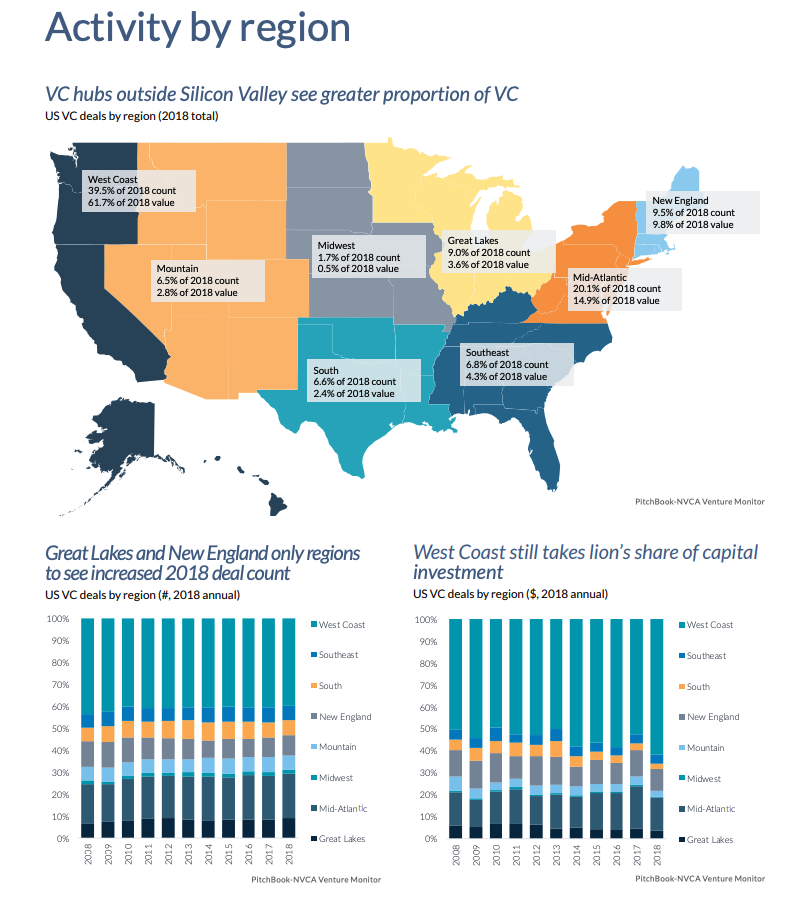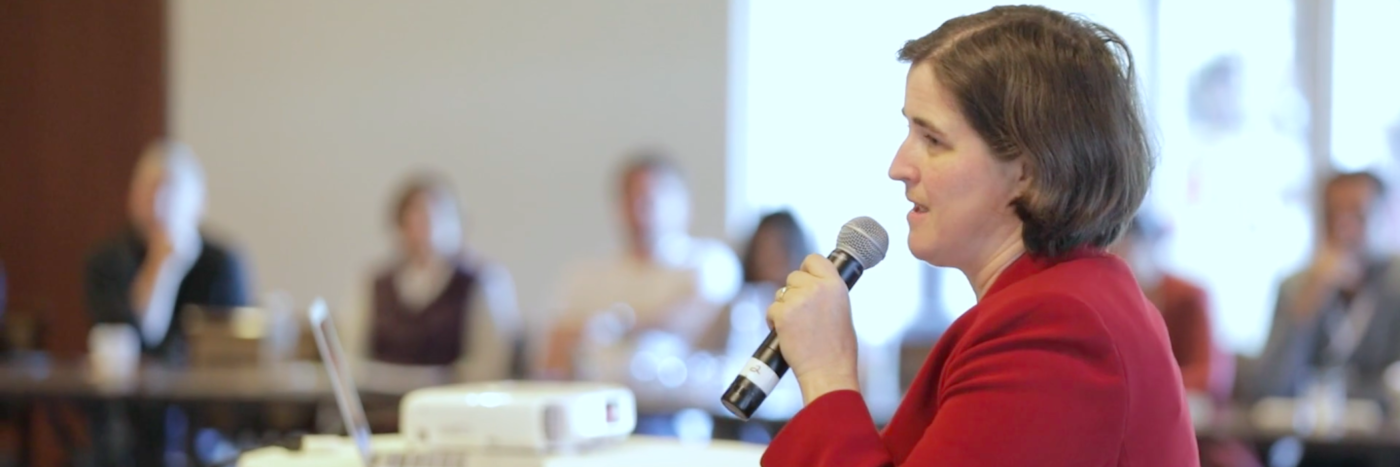
While the location of your startup does not equal success (after all, 95% of startups fail) there are a number of ingredients that if combined, can make certain cities preferable to founding a startup. First, let’s follow the money. On a global scale, 53% of reported funding in Q4 2018 was netted by U.S. companies, with China coming in at 21%. Okay, so if you’re looking to raise, the U.S. and/or China seem like the place. If U.S. companies are netting 52% of reported global funding, that seems like where we should zoom in: Based on the 4Q 2018 NVCA report, “The West Coast still takes the lion’s share of capital investment” (see chart).
So Sandhill Road reigns supreme yet again, right? Let’s keep following the money. According to the Bureau of Economic Analysis, the top 3 most expensive U.S. regions to live in are San Francisco-Oakland-Haywward CA; Santa Cruz-Watsonville CA, and San Jose-Sunnyvalle-Santa Clara, CA. Now imagine hiring tech talent there as an early stage startup, where the average salary is $126,937. We’ve followed the money too far it seems….
This issue permeates the tech startup ecosystem— the funds are in The Valley, but with the cost of living combined with the cost of talent, along with no government aid, the recipe for success seems to be missing a few ingredients. Enter Toronto, ranked #8 on Inc Magazines 50 Most Innovative Cities in the World in 2018, where upwards of 2,100 startup founders have chosen to put down roots.
When building his second startup, Toronto-based Uberflip Founder Yoav Schwartz didn’t follow the money. “We wanted healthy growth, not crazy growth. We wanted a meaningful outcome for all parties involved”, he said when asked why he chose to raise his $36M Series A after only taking $1M in a SAFE to that point. Schwartz serves as an example of the thoughtful, frugal, bootstrap mentality that has come to define the startup community in Toronto. In a time when founders are inundated with headlines about massive rounds raised and hockey-stick growth, Schwartz’s realistic approach to scale is a refreshing take on the founder journey in one of the world’s leading tech hubs outside of Silicon Valley.
Q: What prompted your decision to raise after bootstrapping for 6 years?
Schwartz: Before our A round, we had only raised about $1M before that in a SAFE during a late stage angel round. Up to that point, we had bootstrapped the business. The whole thing forced us to build a very sound company because we didn’t have any extra dollars to spend. We were frugal, and hacky, and smart, and then we reached a point last year where we were ready to fundraise. We weren’t looking to grow at 300% y/y, or to raise VC money at the start— we only wanted to raise once, and not get on a treadmill where we needed to do it every year. So growth equity was how we wanted to go. We wanted healthy growth, not crazy growth. We wanted a meaningful outcome for all parties involved.
Q: Why did you choose a U.S based fund?
Schwartz: I think there’s 2 types of funds: the ones in The Valley, and the ones who refuse to be in The Valley. The latter treat the rest of the market as their market, and that was Updata Partners approach when they reached out to us 2 years ago, before we were ready to raise. We eventually came to a point where we wanted to own the process ourselves, and they were one of 20 firms we were interested in. Before the process even started they made us an offer. We explored it cautiously and it ended up working out.
Q: This is your third startup, 2nd in tech. What challenges did you face with the previous 2 that you learned from when building Uberflip?
Schwartz: The first one had nothing to do with tech, so what I learned there was I wanted to be in tech. The second one did not have a solid business plan, because the ability to monetize it would come so much further down the road. With Uberflip, we were looking to get into SaaS B2B— that was very much a decision.
One of the really big learnings early on was if you are going to sell something that’s relatively new to a market (meaning you’re unique and not competing with a 100 other companies) you cannot sell to SMB’s, you have to go enterprise, because they have the dollars to spend on the problem you’re trying to solve. And now we’re at 6 figures a year and we learned from that inital mistake of focusing on SMB’s.
In the last 5 years, Toronto has emerged as a contender in the tech hub space. Collision is moving to Toronto from New Orleans. What do you think are the advantages of building a startup in Toronto?
1. Amazing talent pool, probably one of the best outside of The Valley. Especially with this being the motherland of artificial intelligence.
2. Cost of labor. When I tell my friends in the valley how much we are spending on developers, they can’t believe it.
3. The government programming. There is no way we would have gotten where we are without their aid.
4. Real estates is significantly less expensive in Toronto compared to the Valley, so office space, etc will be cheaper.
What do you think are the added challenges of building a startup in Toronto?
Schwartz: First, Marketing and Sales talent is a little tough to find here.
Second, and obviously— you’re outside of The Valley. Which is where the majority of your customers and funds are going to be. If you have a competitor in the valley, you’re in trouble. But ultimately you weigh the pros and cons, and make the decision from there.
We ask all our interviewees this: Why is peer mentorship important to you?
Schwartz: For us, especially when you’re starting out a business for the first time, there’s an endless supply of things you don’t know. Mentors provide guidance, shortcuts, a different lens. Some of our best early advisors were VC’s who turned us down, who became advisors and eventually investors. And we are indebted to them because they knew the problems we were going to face at different stages and how to overcome them, and that was paramount to our success. So I enjoy giving back, it’s how the cycle continues.
Learn more about Yoav Schwartz’s Founder Journey at his keynote on April 17th hosted at Project Spaces, Toronto. Full-time tech founders only please.







